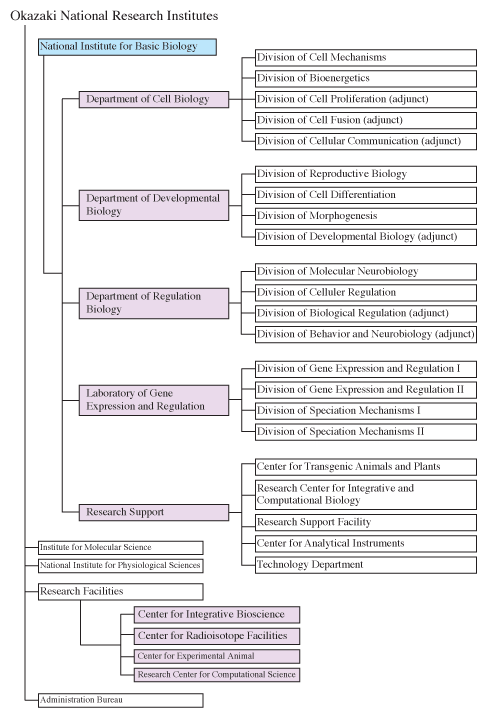| ORGANIZATION OF THE INSTITUTE |
| The National Institute for Basic Biology
(NIBB) is an Institute in the Okazaki National Research Institutes
(ONRI) that are composed of three independent organizations, NIBB,
the Institute for Molecular Science (IMS) and the National Institute
for Physiological Sciences (NIPS). They located on a hill overlooking
the old town of Okazaki. NIBB was established in 1977 and its activities
are supported by Monbukagaku-sho (the Ministry of Education, Culture,
Sports, Science and Technology: Mext) of Japan. The Center for Integrative
Bioscience that was established as a common facility of the ONRI in
2000 and began in 2001. The Director-General oversees the operation of the Institute assisted
by two advisory bodies, the Council and the Advisory Committee for
Programming and Management. The Council, comprised of distinguished
scholars representing various fields of science and culture, advises
the Director-General on principles and policies governing the activities
and operations of NIBB. The Advisory Committee, comprised of professors
within the Institute and an equal number of leading biologists outside
NIBB advises the Director-General, upon his request, on planning joint
research programs and other important matters in NIBB, as well as
on the scientific activities of the Institute. The Council makes a
nomination of Director-General and Committee also makes recommendations
on the Director-General and on faculty appointments, the Institute's
annual budget and future prospects. Administration of the Institute is undertaken by the Administration
Bureau of the ONRI under the direct auspices of the Ministry of Education,
Culture, Sports, Science and Technology.Research The research support facilities of the NIBB consist of the Large Spectrograph
Laboratory, the Tissue and Cell Culture Laboratory, the Computer Laboratory,
the Plant Culture Laboratory, the Plant Cell Culture Laboratory, the
Experimental Farm, the Laboratory of Stress-Resistant Plants and the
Center for Transgenic Animals and Plants. In addition, five facilities
are operated jointly with NIPS; they consist of the Electron Microscope
Center, the Center for Analytical Instruments, the Machine Shop, the
Laboratory Glassware Facilities and the Low-Temperature Facilities.
The Radioisotope Facilities, the Computer Center and the Animal Care
Facilities became common facilities of ONRI. The ONRI covers an area of 164,783m2 with four principal buildings.
The NIBB's main research building has a floor space of 16,789m2.
Two-thirds of the space was completed in 1982 and the remaining third
in June, 1983. The buildings that have the research support facilities
were also completed in 1983. A building for the Laboratory of Gene
Expression and Regulation (2,577m2) was built in 1996.
A building for Center for Transgenic Animals and Plants (2,500m2)
was dedicated in the new campus at November, 2003. |
